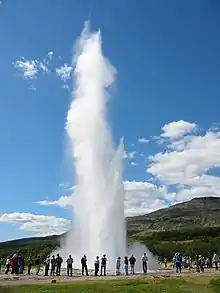geyser
English

The Great Geysir gave its name to all geysers
Etymology
From the name of a particular Icelandic geyser which is mentioned as early as the 1760s in The Annual Register, as “Geyser, a wonderful spring in the valley of Haukadal”.[1] From Geysir (“Gusher”), the Icelandic name of the hot spring in Iceland (see Wikipedia), from the verb geysa (“to gush”), from Old Norse geysa (“to gush”).
Pronunciation
Noun

Strokkur, another Icelandic geyser.
geyser (plural geysers)
- (planetology, geology, volcanology) A boiling natural spring which throws forth at frequent intervals jets of water, mud etc., driven up by the expansive power of steam.
- (Britain, archaic) An instantaneous, and often dangerous, hot water heater.
- 1902. William Paton Buchan, Plumbing: A Text-book to the Practice of the Art Or Craft of the Plumber:
- Where a Geyser or hot-water heater is used it is a good and wise precaution to see that the bath-room, &c., when it is used is well ventilated.
- 1998, Gordon S Riess, Confessions of a Corporate Centurion: Tales of International Adventures
- Water was heated either on the gas stove, or on a wall mounted gas-fired "geyser" heater.
- 2002, Alaine Polcz, One woman in the war: Hungary, 1944-1945:
- It was here I saw a geyser gas water heater in a bathroom for the first time. (I was afraid of it).
- 1902. William Paton Buchan, Plumbing: A Text-book to the Practice of the Art Or Craft of the Plumber:
- (South Africa) A domestic water boiler.
Derived terms
Translations
boiling spring
|
|
archaic: hot water heater — See also translations at hot water heater
domestic water boiler
|
Verb
geyser (third-person singular simple present geysers, present participle geysering, simple past and past participle geysered)
- (transitive, intransitive) To (cause to) rush or burst upward like water from a geyser.
References
This article is issued from Wiktionary. The text is licensed under Creative Commons - Attribution - Sharealike. Additional terms may apply for the media files.